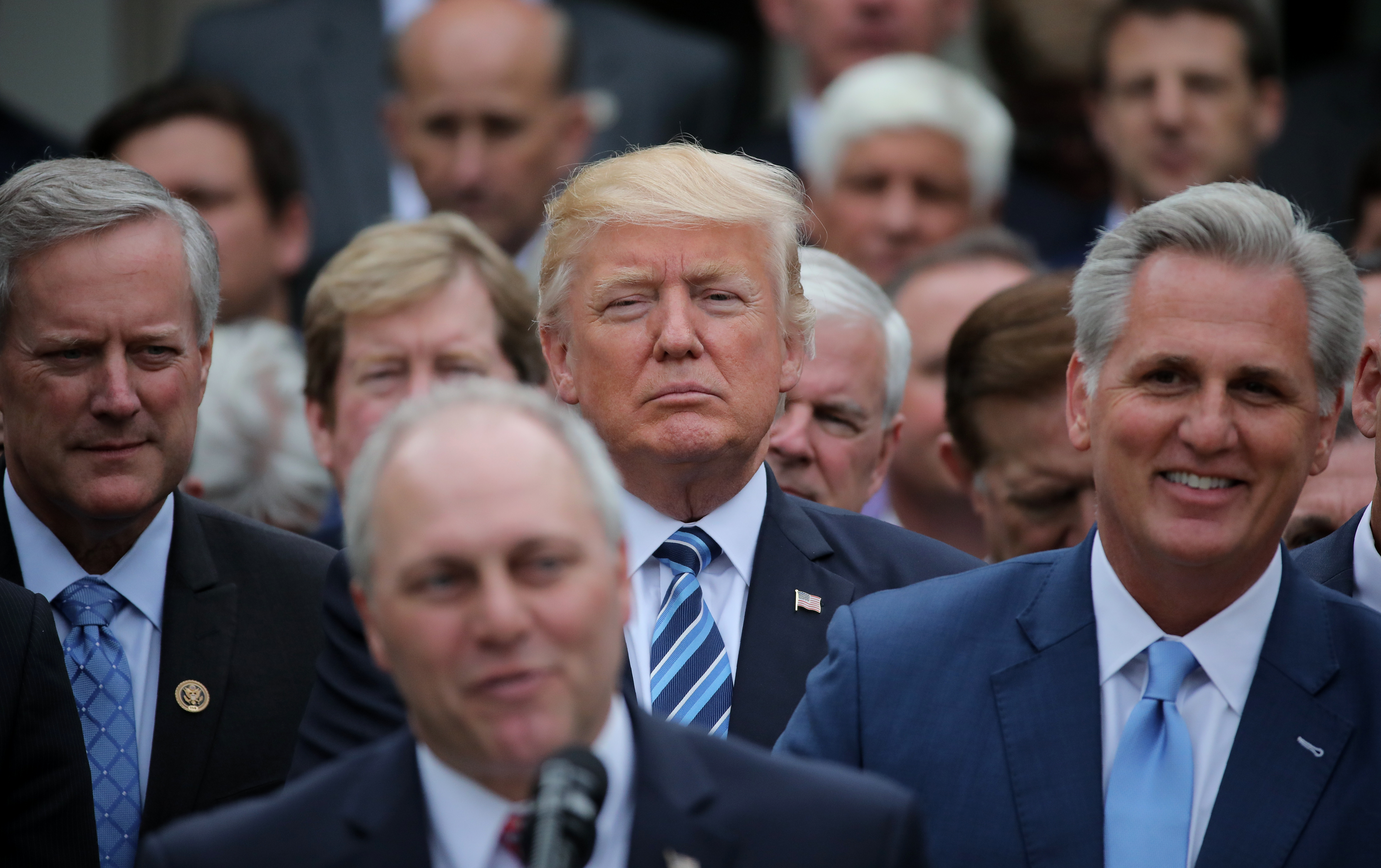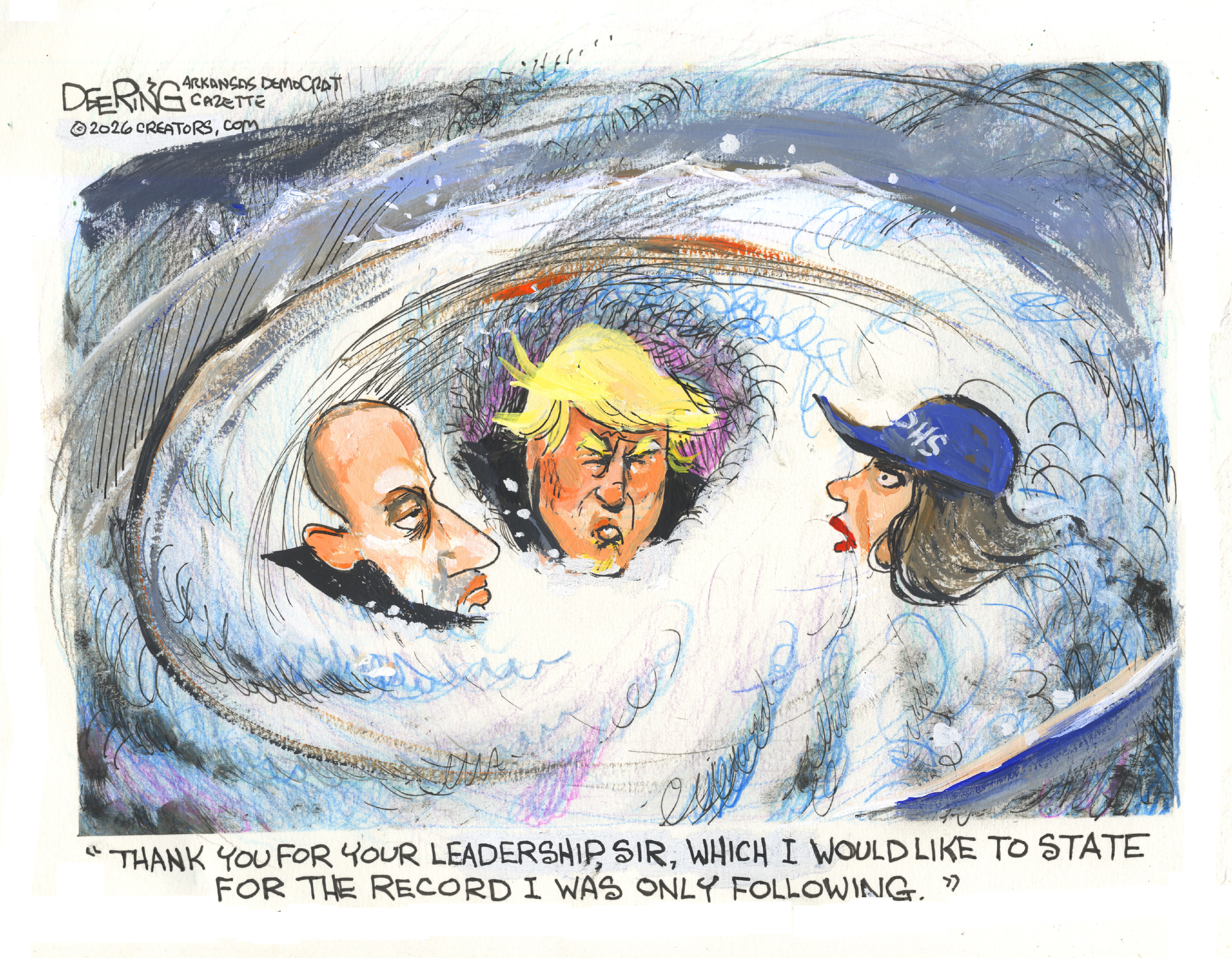Are Republicans going to try to steal the 2018 election?
Trump just named the worst electoral cheater in the country to "investigate" voter fraud


A free daily email with the biggest news stories of the day – and the best features from TheWeek.com
You are now subscribed
Your newsletter sign-up was successful
Republicans are not in good shape for the 2018 midterm elections. The party in general is at 53 percent disapproval in the polling averages, which has been getting steadily worse since the election. Democrats should be in a strong position to make large gains in the midterms, just as they did in 2006.
But that's only assuming there are free and fair elections.
There are already signs that Republicans might try to cheat their way to victory. Exhibit A is Thursday's announcement that the White House is setting up a commission to "investigate" voter fraud in the United States — one helmed by the most notorious electoral cheater in the country, Kansas Secretary of State Kris Kobach.
The Week
Escape your echo chamber. Get the facts behind the news, plus analysis from multiple perspectives.

Sign up for The Week's Free Newsletters
From our morning news briefing to a weekly Good News Newsletter, get the best of The Week delivered directly to your inbox.
From our morning news briefing to a weekly Good News Newsletter, get the best of The Week delivered directly to your inbox.
Cheating is going to be sorely tempting, given the depth of political problems Republicans face — the party disapproval rating isn't the half of it. President Trump is only slightly more popular than the party as a whole — making him the least popular recently elected president in the history of polling. Only 21 percent approve of the most recent Republican health-care bill, an already paltry number that will drop precipitously if the bill passes and the reality of throwing tens of millions off their insurance sinks in. And the Comey scandal is already tainting the party yet more.
While I have no doubt that the party's base will stick with Trump to the bitter end, even if he airholes a Supreme Court justice during a State of the Union address, there aren't enough of them to win national elections.
Indeed, that's part of the reason Republicans will cheat — they likely would not have won the presidency in 2016 without doing so. A non-peer reviewed estimate conducted by a Democratic-aligned organization found that voter suppression reduced voting by 200,000 in Wisconsin alone, where the margin of victory was just under 23,000. A similar study by the Government Accountability Office found voter ID laws cut turnout by over 100,000 votes in Kansas and Tennessee in 2012. Felony disenfranchisement probably won them Florida.
Now, that sort of thing isn't quite the same thing as stealing an election outright.
A free daily email with the biggest news stories of the day – and the best features from TheWeek.com
Electoral fraud exists on a spectrum. On one pole, you have a full-blown dictatorship, where all parties but the ruling one are banned, journalists who criticize the dictator are locked up or killed, and any elections that happen are one-choice affairs where armed secret police look over your shoulder at the voting booth. On the other, you have the scrupulous parliamentary democracy, where citizens are free to vote for any party or form new ones, all adult citizens have the right to vote, electoral mechanics are non-partisan, and there is due process, freedom of the press, assembly, and so forth.
But there are quite a lot of intermediate options in between those two extremes. For one, you can set up voting qualifications to selectively disenfranchise opposition voters. Republicans do this with felony disenfranchisement, voter ID, and other onerous regulations — most of them aimed squarely at black people. For another, you can gerrymander district boundaries to make it nearly impossible for the other side to win. Republicans have done this to give themselves a roughly 7-point advantage in the House of Representatives, and to a far greater extent in state legislatures.
There is a difference between a 7-point handicap and an "election" where men with guns tell you how to vote. But gerrymandering, partisan disenfranchisement, and vote suppression are without question an attempt to overturn the will of the people by rigging the electoral system. The fact that it doesn't disenfranchise everyone only makes it somewhat less horrible.
Gerrymandering obviously has to be done by state legislatures. But Kobach is the national champion at vote suppression:
Mr. Kobach has been the driving force behind a Kansas law requiring new voters to produce a passport, a birth certificate, or naturalization papers as proof of citizenship or be denied the ability to cast ballots. He worked last year to disqualify the state and local votes of thousands of people who did not meet the criteria. He has advocated the proof-of-citizenship requirement at the federal level as well, citing rampant voter fraud without producing proof of a widespread problem. [The New York Times]
He produces no proof because there is none. Large studies — not to mention an investigation by Kobach himself — have found, at most, a tiny handful of cases of possible in-person voter fraud — thousands or millions of votes short of actually swinging an election. You steal an election by controlling the count, or by rigging the procedures, not by getting city-sized groups of people to commit serious felonies en masse. It is absolutely beyond question that the motivation here is partisan advantage for Republicans.
Kobach will almost certainly recommend national-level measures to suppress liberal votes, and will enable state-level efforts to roll back democracy as well. Whether there are meaningful elections next year may depend on whether such measures can be stopped.
Ryan Cooper is a national correspondent at TheWeek.com. His work has appeared in the Washington Monthly, The New Republic, and the Washington Post.
-
 6 gorgeous homes in warm climes
6 gorgeous homes in warm climesFeature Featuring a Spanish Revival in Tucson and Richard Neutra-designed modernist home in Los Angeles
-
 Russia’s ‘cyborg’ spy pigeons
Russia’s ‘cyborg’ spy pigeonsUnder the Radar Moscow neurotech company with Kremlin-linked funding claims to implant neural chips in birds’ brains to control their flight, and create ‘bio-drones’
-
 Political cartoons for February 8
Political cartoons for February 8Cartoons Sunday’s political cartoons include going down the drain, American history, and more
-
 The billionaires’ wealth tax: a catastrophe for California?
The billionaires’ wealth tax: a catastrophe for California?Talking Point Peter Thiel and Larry Page preparing to change state residency
-
 Bari Weiss’ ‘60 Minutes’ scandal is about more than one report
Bari Weiss’ ‘60 Minutes’ scandal is about more than one reportIN THE SPOTLIGHT By blocking an approved segment on a controversial prison holding US deportees in El Salvador, the editor-in-chief of CBS News has become the main story
-
 Has Zohran Mamdani shown the Democrats how to win again?
Has Zohran Mamdani shown the Democrats how to win again?Today’s Big Question New York City mayoral election touted as victory for left-wing populists but moderate centrist wins elsewhere present more complex path for Democratic Party
-
 Millions turn out for anti-Trump ‘No Kings’ rallies
Millions turn out for anti-Trump ‘No Kings’ ralliesSpeed Read An estimated 7 million people participated, 2 million more than at the first ‘No Kings’ protest in June
-
 Ghislaine Maxwell: angling for a Trump pardon
Ghislaine Maxwell: angling for a Trump pardonTalking Point Convicted sex trafficker's testimony could shed new light on president's links to Jeffrey Epstein
-
 The last words and final moments of 40 presidents
The last words and final moments of 40 presidentsThe Explainer Some are eloquent quotes worthy of the holders of the highest office in the nation, and others... aren't
-
 The JFK files: the truth at last?
The JFK files: the truth at last?In The Spotlight More than 64,000 previously classified documents relating the 1963 assassination of John F. Kennedy have been released by the Trump administration
-
 'Seriously, not literally': how should the world take Donald Trump?
'Seriously, not literally': how should the world take Donald Trump?Today's big question White House rhetoric and reality look likely to become increasingly blurred
